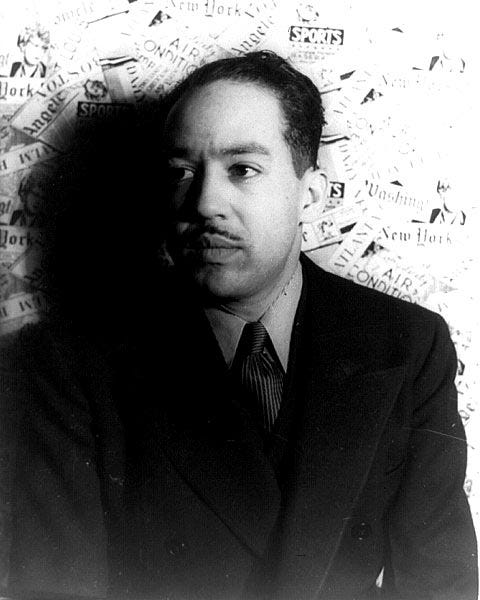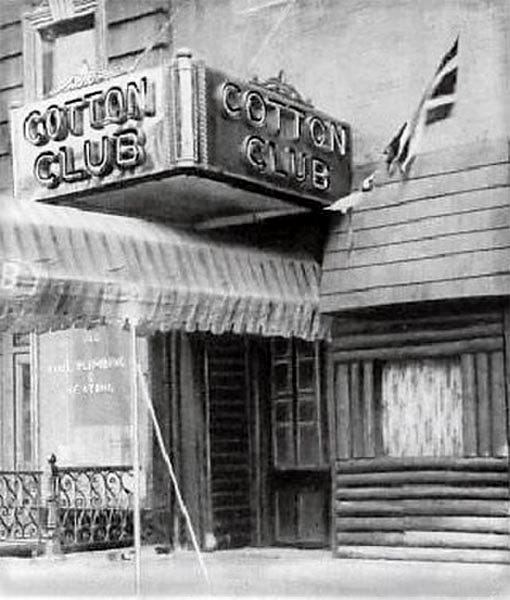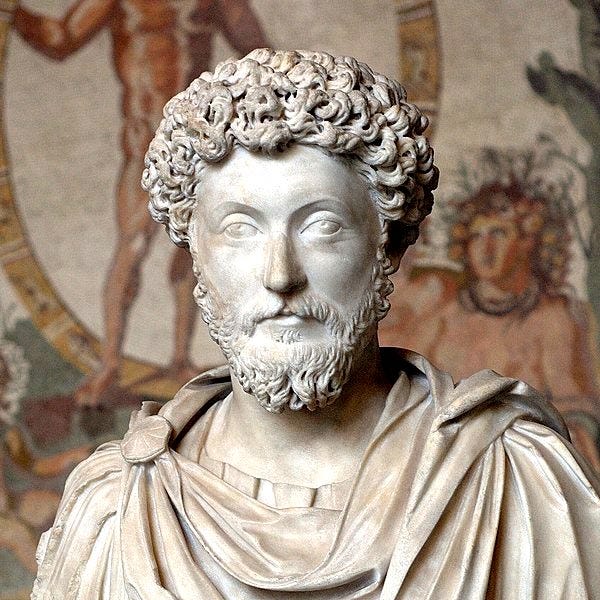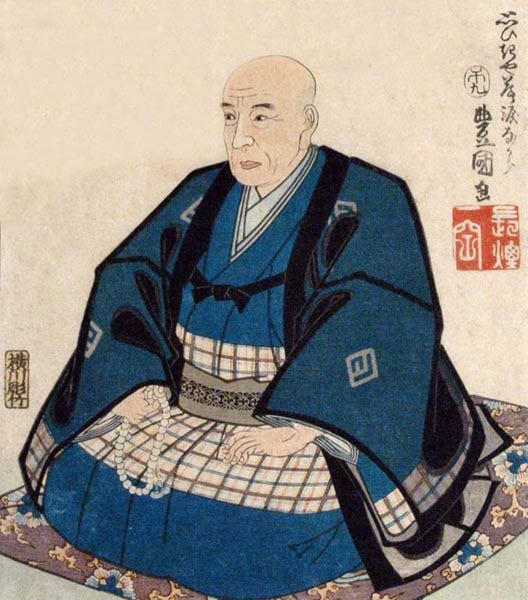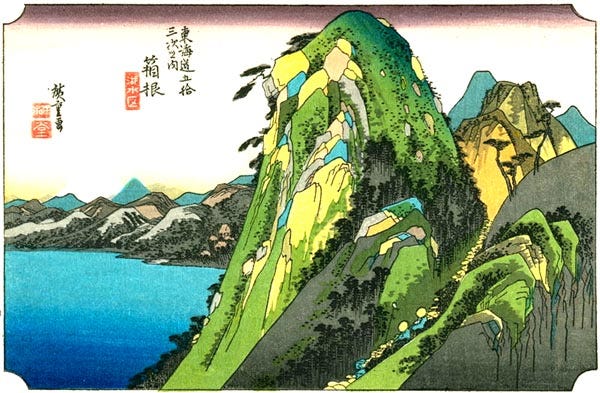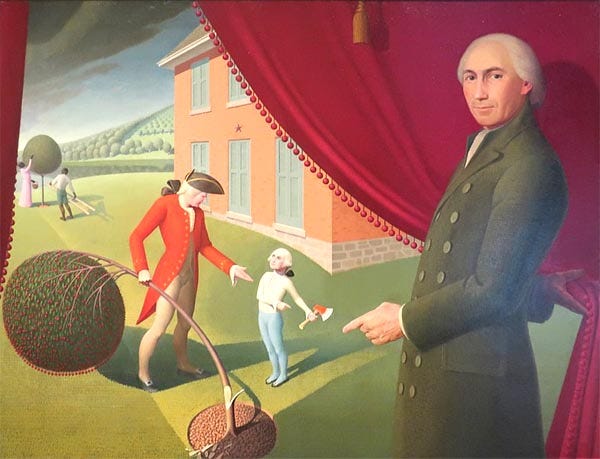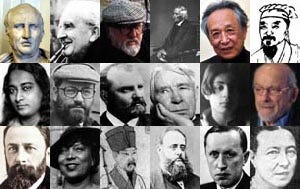Vol. I, Is. 10: Langston Hughes... and More!
Plus Marcus Aurelius, Hiroshige, "Washington and the Cherry Tree," "The Cat and the Fiddle"
Dear Friends: I truly enjoy bringing you this newsletter every week--all ten of you! But as you might imagine, it takes a LOT of time.
Hear ye, hear ye:
WHEREAS:
This is the tenth issue (a nice round number); AND
It's a new year (and I hope a happy one for you); AND
There are a few other things I want to work on, including video and broadening the audience for the work I've already published;
THEREFORE:
Beginning with Issue 11, The Jim Bucket List will be coming to you fortnightly (isn't that a great word?); that is, every two weeks.
So please look forward to your next issue on Monday, January 17th.
Meanwhile, if there's anything I can do for you, please let me know!
Welcome to Volume I, Issue 10, of The Jim Bucket List, an encyclopedic look at the things that "everybody ought to know"!
Contents:
LITERATURE: Langston Hughes, Poet of the Harlem Renaissance
TIDBITS: Common Mistakes
PHILOSOPHY: Marcus Aurelius, Philosopher-Emperor
TIDBITS: Fun with Words: Freudian slips (parapraxis)
ART: Hiroshige, Japanese Woodblock Artist
TIDBITS: Truly Trivial
FOR YOUNG READERS: "George Washington and the Cherry Tree"
READ-ALOUD-RHYME: "The Cat and the Fiddle"
A WORD TO THE WISE: "Two heads are better than one"
VOCABULARY BUILDER: specific
THIS WEEK'S BIRTHDAYS: January 3-9
Let's go!
LITERATURE: Langston Hughes, Poet of the Harlem Renaissance
Listen to the audio of this article:
Langston Hughes
The American "jazz poet" Langston Hughes (1902-1967) worked in a fascinating era. Born less than a half-century after the enslaved Black people of America gained their freedom, he lived in a time of expansive creativity and new opportunity, while racial oppression was still devastatingly common. Although he worked as a novelist, playwright, and columnist, it is for his poetry that he is best remembered.
Hughes was born in Joplin, Missouri. When he was a young child, his family moved frequently around the Midwest. After his parents' divorce, he was fostered out, first to his grandmother, and then to family friends. He wrote of this time: "I was unhappy for a long time, and very lonesome, living with my grandmother. Then it was that books began to happen to me, and I began to believe in nothing but books and the wonderful world in books--where if people suffered, they suffered in beautiful language, not in monosyllables, as we did in Kansas."
He was elected class poet in grammar school, and wrote for the high school newspaper in Cleveland, Ohio, where he was also editor of the school yearbook. At this time, he began his creative writing, as well.
Following his father's wishes, he began to study engineering at Columbia University in New York, but left because of racial prejudice on the part of professors and fellow-students. While a student he often frequented Harlem, a "Black" neighborhood of jazz clubs and night life. He traveled abroad, and returned to complete his degree around age 27 at Lincoln University in Pennsylvania. After graduation, he returned to Harlem, where he remained the rest of his life.
Hughes is most prominently associated with the Harlem Renaissance, a movement centered in Harlem from the late 'teens to the mid-thirties, though some of its proponents lived elsewhere (including Paris), and its influence lasted much longer.
Like the other writers in the movement, Hughes was unabashed about his race, and celebrated it in poems like "The Negro Speaks of Rivers" (which he wrote at age seventeen, in, as he says, about "ten or fifteen minutes" on "the back of an envelope"):
I've known rivers:
I've known rivers ancient as the world and older than the
flow of human blood in human veins.My soul has grown deep like the rivers.
I bathed in the Euphrates when dawns were young.
I built my hut near the Congo and it lulled me to sleep.
I looked upon the Nile and raised the pyramids above it.
I heard the singing of the Mississippi when Abe Lincoln
went down to New Orleans, and I've seen its muddy
bosom turn all golden in the sunset.I've known rivers:
Ancient, dusky rivers.My soul has grown deep like the rivers.
"Harlem" expresses some of the frustration felt when barriers are encountered, seen or unseen. The poem evokes a verse in the Bible, Proverbs 13:12: "Hope deferred maketh the heart sick: but when the desire cometh, it is a tree of life."
What happens to a dream deferred?
Does it dry up
like a raisin in the sun?
Or fester like a sore--
And then run?
Does it stink like rotten meat?
Or crust and sugar over--
like a syrupy sweet?Maybe it just sags
like a heavy load.Or does it explode?
Lorraine Hansberry's play A Raisin in the Sun in turn takes its title from Hughes's poem.
"I, Too" embodies a similar sentiment.
I, too, sing America.
I am the darker brother.
They send me to eat in the kitchen
When company comes,
But I laugh,
And eat well,
And grow strong.Tomorrow,
I'll be at the table
When company comes.
Nobody'll dare
Say to me
"Eat in the kitchen,"
Then.Besides,
They'll see how beautiful I am
And be ashamed-
I, too, am America.
Hughes died at age 66 from complications after abdominal surgery related to prostate cancer. His ashes are interred in a Black cultural center in Harlem.
--------
PRACTICE:
Vocabulary: Match the words to their meaning. Correct answers are below.
1. abdominal
2. bosom
3. complications
4. crust
5. deferred
6. devastatingly
7. dusky
8. embodies
9. evokes
10. expansive
11. fester
12. fostered (out)
13. frequented
14. interred
15. monosyllables
16. prominently
17. proponents
18. sags
19. syrupy
20. unabashed
A. people who are in favor of, or who support, something
B. buried
C. gives form to; expresses
D. like a sticky liquid
E. of the "belly"
F. noticeably; obviously
G. hangs down
H. get infected; become filled with pus; grow worse
I. placed in a home outside of one's family
J. encouraging new, wider activities
K. often went to
L. calls forth; brings to mind
M. not ashamed or embarrassed
N. form a hard surface over
O. breast; surface
P. single sounds like "uh" and "oh"
Q. dark; shadowy
R. delayed; put off, sometimes indefinitely
S. causing much grief or dismay
T. difficulties; negative reactions
QUESTIONS TO ANSWER
Answer the following questions in your own words. Suggested answers are below.
What was unusual about Harlem when Hughes lived and worked there? What was not so good about it?
What early life experience did Hughes have that encouraged him to read?
What were some of Hughes's early achievements as a writer?
Why did Hughes drop out of Columbia University?
What other experiences did Hughes have before moving to Harlem?
QUESTIONS TO THINK ABOUT:
These questions do not have "right" or "wrong" answers. They only ask your opinion.
Which of the three poems--"The Negro Speaks of Rivers," "Harlem," or "I, Too"--do you like best? Why? Which do you like the least?
Find out where each of these rivers is located: the Euphrates, the Congo, the Nile, and the Mississippi. What is significant about each of these places, perhaps especially for a Black American?
What do you think happens when the fulfillment of a hope is delayed, when a "dream [is] deferred"?
What is Hughes saying about the treatment of Black Americans in his time, and what does he predict (or at least hope for) in their future? has his prediction come true (yet)?
TIDBITS: Common Mistakes
WRONG: He did a 360 and completely changed his mind.
RIGHT: He did a 180 and completely changed his mind.
MEANING: A circle has 360 degrees, so half of the circle has 180. To do an "about face" is to turn a half a circle.
TIP: If you turn 360 degrees you'll be facing forward again!
--------
WRONG: Our two styles don't really jive.
RIGHT: Our two styles don't really jibe.
MEANING: Jive is a type of dancing, or a joking way of speaking. Jibe means "to fit together."
TIP: "We didn't jiBe because he kept jiVing with me." (B before V.)
--------
WRONG: I poured over the accounts but couldn't find any mistakes.
RIGHT: I pored over the accounts but couldn't find any mistakes.
MEANING: Pour means to empty a liquid from something (don't pour anything over your accounts!). Pore means to read or study something closely.
TIP: “PoRe over the books before you poUr something over them!” (R before U.)
PHILOSOPHY: Marcus Aurelius, Philosopher-Emperor
Listen to the audio of this article:
Marcus Aurelius
The Stoic philosopher Marcus Aurelius was not just "any old writer": he was a Roman Emperor, and a fairly successful one by most accounts: he was the last of the "Five Good Emperors," so-called because almost all of those who followed after him were so bad. He lived from 121 to 180, and ruled from 161 until his death.
Though busy leading the empire, Marcus took time to write down his thoughts, often, it is believed, while he was out in the field on a military campaign: in those days, a king was also expected to be a general and warrior.
Stoicism is a school of philosophy that says one should live a good life in accordance with nature, aligning one's decisions with the way things are. To be so aligned was considered "virtue." The modern meaning of "stoic," which is to be unmoved by joy or (especially) grief, and to accept whatever happens with equanimity, comes from this idea.
The book that we call Meditations was actually Marcus's private journal; the title was added much later (and in fact it has had several, including Treatise to Himself). There is no indication that he thought it would be seen by others, let alone published. So keep in mind that in the following selections from the Meditations, when Marcus says you, he is addressing himself, reminding himself of how to behave.
If you are troubled by any external thing, it is not the thing that disturbs you, but your own attitude toward it. And it is in your power to change this attitude now…. Is a cucumber bitter? Throw it away. Are there briars in the road? Turn aside from them. This is enough. Do not add, "And why were such things made in the world?"
Be like a rocky promontory against which the restless surf continually pounds; it stands firm while the churning sea is lulled to sleep at its feet. I hear you say [when bad things happen], "How unlucky that this should happen to me!" Not at all! Say instead, "How lucky that I am not broken by what has happened and am not afraid of what is about to happen. The same blow might have struck anyone, but not many would have absorbed it without capitulation or complaint."
I have often wondered how it is that every man loves himself more than all the rest of men, but yet sets less value on his own opinion of himself than on the opinion of others.
When you wake up in the morning, tell yourself: "The people I deal with today will be meddling, ungrateful, arrogant, dishonest, jealous and surly. They are like this because they can't tell good from evil. But I have seen the beauty of good, and the ugliness of evil, and have recognized that the wrongdoer has a nature related to my own - not of the same blood and birth, but the same mind, and possessing a share of the divine. And so none of them can hurt me. No one can implicate me in ugliness. Nor can I feel angry at my relative, or hate him. We were born to work together like feet, hands and eyes, like the two rows of teeth, upper and lower. To obstruct each other is unnatural. To feel anger at someone, to turn your back on him: these are unnatural."
Live a good life. If there are gods and they are just, then they will not care how devout you have been, but will welcome you based on the virtues you have lived by. If there are gods, but unjust, then you should not want to worship them. If there are no gods, then you will be gone, but will have lived a noble life that will live on in the memories of your loved ones.
How much time he gains who does not look to see what his neighbor says or does or thinks, but only at what he does himself, to make it just and holy.
Let me encourage you to find a copy of the Meditations and dip into it regularly.
--------
PRACTICE:
Vocabulary: Match the words to their meaning. Correct answers are below.
1. absorbed it
2. aligned
3. briars
4. capitulation
5. churning
6. equanimity
7. implicate
8. in accordance with
9. lulled
10. meddling
11. obstruct
12. promontory
13. surly
14. unjust
15. virtue
A. soothed; quieted
B. giving up; surrendering
C. plants with sharp thorns
D. following along with; conforming to
E. mental or emotional stability in a time of stress
F. interfering (with)
G. swirling; agitated
H. get in the way of; prevent
I. accepted it; taken it in
J. unfair
K. moral excellence; goodness; righteousness
L. brought into agreement; lined up (with)
M. a high point of land projecting into the sea
N. involve; include (usually in a negative way)
O. rude; bad-tempered; unfriendly
QUESTIONS TO ANSWER
Answer the following questions in your own words. Suggested answers are below.
How do we know Marcus Aurelius was a successful ruler?
Where was Marcus during much of the time he wrote the Meditations?
What is the basic idea of Stoicism?
Did Marcus call his book Meditations?
To whom did Marcus address his work?
QUESTIONS TO THINK ABOUT:
These questions do not have "right" or "wrong" answers. They only ask your opinion.
Do you think it would be easy to accept the Stoic point of view, accepting all things as they are? Why or why not?
Marcus was an emperor. Does it surprise you that he would be so concerned about being a good person? Why or why not?
If someone found a journal with your private thoughts, would you want it to be published? If so, what title do you think it should have? If not, why not?
TIDBITS: Fun with Words: Freudian slips (parapraxis)
Someone said, "A Freudian slip is when you say one thing but you mean your mother."
Sigmund Freud, the founder of psychoanalysis, claimed that sometimes what seems like a "slip of the tongue" might actually be revealing what someone really things, and the "slip" is like the truth trying to reveal itself.
Note there are other kinds of slip besides those of the tongue--mistakes in hearing, typing, even losing something may reveal someone's true feelings. Example: Your partner gives you a valuable ring and you lose it immediately. This might be a way for your subconscious to tell you your true feelings for your partner.
But this is "Fun with WORDS," so let's stick with slips of the tongue.
--------
Here are some classic examples. See if you can guess what word was meant.
At the end of a wedding ceremony, a minister wished the new couple "a sexful life ahead."
A woman was looking for a job, and was interviewed by a man who was not very tall. She wrote the interviewer a thank you note and ended it with, "I look forward to hearing from you shorty."
A man was complaining that he was losing his hair. His wife said, "Oh, don't be silly. Now eat your bald egg."
And the best ever (though it probably never happened): Someone was supposedly introducing Freud and said, "Ladies and gentlemen, the eminent psychiatrist Doctor Sigmund Fraud!"
Answers below.
ART: Hiroshige, Japanese Woodblock Artist
Listen to the audio of this article:
Hiroshige
The Japanese artist Utagawa Hiroshige (1797-1858; also called Ando Hiroshige but usually known simply as "Hiroshige") was a traveler and keen observer.
Hiroshige was born in what was then called Edo, now Tokyo. His parents died when he was twelve; his father, fire warden for the area, left his duties to his young son. In charge of preventing fires in the Shogun's home, Edo Castle, he began painting during his ample leisure time. Though working as an apprentice, by age 15 he was permitted to sign his own works.
At age 26, he passed most of his fire warden duties on to his son, and continued to paint and produce ukiyo-e, the woodblock prints for which he became famous. The art of woodblock printing is a painstaking process. The artist carves a piece of wood (in reverse) and makes a print from it. At first, prints were in one color, sometimes with other colors added by hand.
But by Hiroshige's time, prints were often made using multiple blocks, one for each color. This allowed for easy reproduction, and the beautiful but inexpensive prints were collected by the rising merchant class in Edo.
Hiroshige came along near the end of ukiyo-e's two centuries of popularity. He produced over 8,000 works, mainly on the popular themes of the day: beautiful women, famous actors, historical and literary scenes, flowers and animals, and, most notably, landscapes.
Perhaps the most famous of these is his Fifty-three Stations of the Tokaido (made in several editions, the first in 1833-34). This showed the stations along a road from Edo to Kyoto. At that time, the Emperor lived in Kyoto, but the military ruler, the Shogun, was in Edo. The road was built with 53 stations along the way, to facilitate rapid communication between the two cities.
[In 2001, the 400th anniversary of that road, I made the journey, walking for 35 days entirely on foot. Along the way, I tried my best to take photos matching the scenes Hiroshige portrayed. Though much has changed, some of the sights were still there to be seen.]
In 1856, Hiroshige retired from the outside world and became a Buddhist monk. He died in 1858, just as modernization was bringing an end to the popularity of ukiyo-e. His influence lived on, however, and Western artists like Monet and van Gogh were known to be admirers of his work.
--------
PRACTICE:
Vocabulary: Match the words to their meaning. Correct answers are below.
1. admirers
2. ample
3. apprentice
4. carves
5. facilitate
6. in reverse
7. keen observer
8. literary
9. notably
10. painstaking
11. reproduction
12. warden
A. making copies
B. a kind of student who works for a "master"
C. plenty of
D. make something easier or even possible
E. requiring great care and/or hard work
F. backwards
G. importantly
H. a kind of guard; person in charge of
I. from stories or poems
J. one who looks carefully
K. people who like or respect something
L. cuts into something using a knife
QUESTIONS TO ANSWER
Answer the following questions in your own words. Suggested answers are below.
What unusual job did Hiroshige have as a boy?
How did his "day job" make it possible for him to become a painter?
What is an ukiyo-e? Who bought them?
What were some of the subjects of Hiroshige's art? What series was especially well known?
How did Hiroshige influence western art?
QUESTIONS TO THINK ABOUT:
These questions do not have "right" or "wrong" answers. They only ask your opinion.
What advantage do you think ukiyo-e artists had over, say, oil painters?
Why do you think travel pictures were so popular? What sorts of "travel pictures" do we make today?
Why do you think a successful artist like Hiroshige would become a Buddhist monk?
TIDBITS: Truly Trivial
Did you know?
Foundering Fathers: Three of America's first five presidents died on July 4th, the day independence was declared. John Adams (#2) and Thomas Jefferson (#3) both died in 1826; James Monroe (#5) in 1831.
A Heart as Big As a...: The largest animal on earth is the 40,000-pound blue whale. Its heart alone is five feet long and weighs 400 pounds. Our hearts are the size of a fist and average around 10 ounces: that's 5/8 of a pound, or about 1/640 of the whale's.
The Deadliest Predator: What animal kills the most humans every year: the tiger? The wolf? The wombat? Nope, it's the mosquito. Worldwide, over a million people die from malaria, dengue, West Nile, yellow fever, Zika, and other mosquito-borne diseases every year.
FOR YOUNG READERS: “George Washington and the Cherry Tree”
Listen to the audio of this article:
George Washington and the Cherry Tree
This article is designed for younger readers, with activities more suitable for children. It is from American folklore.
In 1800, a man named Mason Locke Weems (1759-1825), usually referred to as "Parson Weems," wrote a story about George Washington, the first President of the United States. Weems said it was told to him by an old lady who was a "cousin" of Washington's. Today we know the story didn't really happen. But we keep telling it for the lesson it teaches, and because it makes Washington look like a good man.
The story the old lady told goes like this:
When George was about six years old, his father gave him a hatchet. Like most little boys, he liked his hatchet very much. He went around chopping everything he saw.
One day he was in the garden, chopping the sticks his mother used to hold up her vegetables. But when he got bored with this, he cut the trunk of his father's favorite cherry tree.
The next day, his father saw what happened to the tree. He went in the house and asked in an angry voice, "Who cut my tree! It's probably going to die!"
At first no one answered. But then George came into the room, carrying his hatchet. "George," his father asked, "do you know who killed that beautiful cherry tree in the garden?"
It was a difficult question, but after a minute George looked at his father and said, "I can't tell a lie, Pa. I cut it with my hatchet."
"Run to my arms, dear boy," his father said, hugging him. "A tree is only a tree. But to have a son so brave and so honest is worth more than a thousand trees, even if their flowers were silver, and their fruit was gold!"
Some words to talk about:
chopping: cutting by hitting with something sharp
hatchet: a small ax, a tool for cutting trees and other wood
hugging: putting your arms around someone and squeezing (nicely!)
trunk: the main part of a tree, that holds up the rest
is worth more: has more value; is more important
--------
QUESTIONS TO ANSWER:
Choose the best answer. Correct answers are below.
Why did George Washington cut the trunk of his father's favorite cherry tree?
A. He was bored after cutting some other things.
B. He was angry with his father.
C. He hated the vegetables his mother was growing.What did George's father think would happen to the tree after George cut it?
A. He thought the tree would die.
B. He thought the tree would have golden fruit.
C. He thought the tree would needed to be cut.Why didn't George answer right away?
A. He was afraid his father would punish him.
B. He didn't want his mother to know he had cut the sticks in her garden.
C. He wasn't in the room when his father asked the question.What did George say before telling his father that he cut the tree?
A. "Please don't punish me, but..."
B. "I can't tell a lie, Pa..."
C. "The tree looked sick, so..."What did George's father say after he told the truth?
A. He said that he was going to punish George.
B. He said that George had to work in his mother's garden.
C. He said it was better to have an honest son than a wonderful tree.
QUESTIONS TO THINK ABOUT:
These questions do not have "right" or "wrong" answers. They only ask your opinion.
Why do we keep telling stories about famous people that we know are not true?
Why would a father give a boy a dangerous "toy" like a hatchet?
Would you always tell the truth, even if you might get punished for it?
READ-ALOUD-RHYMES: “The Cat and the Fiddle”
Listen to the audio of this article:
The Cat and the Fiddle
Parents and teachers can read these rhymes aloud, and encourage little ones to repeat and even memorize them (I did when I was a kid!) Many people have tried to find "meaning" in this old rhyme--but most agree there is none! It's just nonsense, something fun to say. Enjoy!
Hey diddle, diddle!
The cat and the fiddle,
The cow jumped over the moon;
The little dog laughed
To see such sport,
And the dish ran away with the spoon.
Some words to talk about:
fiddle: a violin, a type of musical instrument
sport: something fun to do
ACTIVITIES
Let's do some more pretending! First, ask your kid how he or she would "pretend" each of the lines. Then you can suggest doing the following things as you say the poem:
Hey diddle, diddle!
[do a little dance step, or just "wiggle"!]The cat and the fiddle,
[play a fiddle, while saying "meow!"]The cow jumped over the moon;
[make a big leap, over a ball if you have one]The little dog laughed to see such sport,
[hold your sides and move like you're laughing; maybe bark a little]And the dish ran away with the spoon.
[run away, holding hands with a friend if one is with you]
Discussion: Does the rhyme say the cat is playing the fiddle? What do you think he's doing with it? Can a cow really jump over the moon? (Look at the picture for an idea; see the moon in the water?) Can dogs laugh? Can dishes and spoons run? Why does the rhyme say all these silly things?
Words to the Wise: "Two heads are better than one"
Proverb: Two heads are better than one.
This is an old idea. The Bible says of people, "Two are better than one," and the Greek philosopher Aristotle says the same: "Two good men are better than one." In 1546, John Heywood wrote in his Proverbs:
Some heads have considered two heads to be better than one
But ten heads without wit I consider as good as none.
(I have modernized Heywood's version.)
Meaning: It's easier to find the solution to a problem if you have someone to help you think about it.
Remember: another person can have a different point of view, or know something you don't know.
Mini-Dialogue: Alex sees his friend Jon at a study table looking worried.
Alex: Hey, Jon. What's wrong?
Jon: These math problems! I wish I could afford a tutor!
Alex: You don't need to pay anyone. Just get a "study buddy."
Jon: What, like, just a friend?
Alex: Exactly! Someone to help you see your "blind spots." You know, "Two heads are better than one."
Jon: Good idea!
QUESTION:
In which situation would you use the proverb, "Two heads are better than one"? The correct answer is below.
A. Your project manager suggests you talk with another team member to help you solve a problem.
B. Your friend insists that you bring a date to the dance.
C. The scientist kept his research a secret so no one would steal his ideas.
Vocabulary Builder: specific
specific (adjective)
Meaning: exact; definite; used for a certain purpose
This can (rarely) be a noun, as in a medicine that's a "perfect match" for a problem: "There is no specific for the common cold."
Verb Forms: specify, specifies, specified, specifying
Noun Forms:
specifications (singular: specification): the "specs" or requirements of something: "This tire's specifications call for 45 pounds of air pressure."
specificity: the quality of being specific. "She reported on the conversation with a high degree of specificity."
specifics: not exactly a plural of "specific," this means "details": "I can't get into the specifics right now, but generally speaking..."
Adverb Form:
specifically: in a specific or exact way: "I specifically told you not to wake me until 7 a.m.!"
--------
PRACTICE:
Place the correct form of "specific" in each sentence. Correct answers are below.
1. specific
2. specifically
3. specification
4. specifications
5. specificity
6. specifics
7. specified
8. specifies
9. specify
10. specifying
A. The ________ for manufacturing these items must be exact.
B. This is not the item the customer ________; we need to serve him the correct one.
C. I need to know ________ which item you are ordering from our menu.
D. When the customer ________ a certain part, we should be sure to send the one she wanted.
E. Please calculate the costs with great ________.
F. Can I give you an estimate, or do you need a ________ number?
G. What is the ________ for boiling water in Fahrenheit?
H. Please try to ________ your needs exactly so we can give you the best service possible.
I. Instead of ________ an exact order in a restaurant, you can tell the table staff what you like and they'll try to match your taste to their menu.
J. I can't agree to go with you until you tell me the ________ of your itinerary.
THIS WEEK'S BIRTHDAYS: Jan. 3-9
The following "Great Minds" were born this week:
January 3
Cicero (106-43 BCE) Roman orator, author, and letter-writer who wrote these orations: In Verrem (Against Verres); In Catilinam (Catiline Orations) I-IV; Philippicae (Philippics); and philosophical works: De Oratore (On the Orator); De Re Publica (On the Commonwealth); De Legibus (On the Laws); De Finibus (On the Ends of Good and Evil); De Natura Deorum (On the Nature of the Gods); De Officiis (On Obligations)
J. R. R. Tolkien (1892-1973) English author of The Lord of the Rings and The Hobbit, who was also a scholar and translator of medieval literature
Sergio Leone (1929-1989) Italian filmmaker of "Spaghetti Westerns"; the Dollars trilogy (A Fistful of Dollars; For a Few Dollars More; The Good, the Bad and the Ugly); Once Upon a Time in the West; Once Upon a Time in America
January 4
Jacob Grimm (1785-1863) German folklorist known for Kinder-und Hausmärchen (Children's and Household Tales, with brother Wilhelm), better known as Grimm's Fairy Tales, which the brothers first published to finance their research; Deutsche Mythologie (Teutonic Mythology)
Gao Xingjian (1940 - ) Chinese novelist, playwright, and critic; Buying a Fishing Rod for My Grandfather (short story collection); Soul Mountain; One Man's Bible; won the Nobel Prize in Literature (2000)
January 5
Xu Xiake (1587-1641) Chinese Ming-dynasty travel writer and geographer known for his postumously-compiled Xu Xiake Youji (Xu Xiake's Travels), covering all of the 16 provinces of the China of his time.
Paramahansa Yogananda (1893-1952) Indian yogi who published the first edition of his Autobiography of a Yogi in 1946; it has been greatly expanded since then.
Umberto Eco (1932-2016) Italian novelist, critic, and philosopher whose complex novels reflected his work in semiotics; The Name of the Rose; Foucault's Pendulum; The Island of the Day Before; The Prague Cemetery. But he also wrote children's books, and far more non-fiction than his "mere" seven novels.
January 6
Clarence King (1842-1901) American geologist and author who wrote Mountaineering in the Sierra Nevada when he was U.S. Geologist of the 1867 Fortieth Parallel Survey from northeastern California to eastern Wyoming. He was subsequently the first director of the United States Geological Survey (USGS). In his last 13 years, King also led a double life as a (blue-eyed, fair-skinned) African American in a common-law marriage with the formerly-enslaved Ada Copeland.
Carl Sandburg (1878-1967) American poet, writer, and editor; poetry Chicago Poems; The People, Yes; history Abraham Lincoln: The Prairie Years and The War Years; Rootabaga Stories for children; he received two Pulitzer Prizes in Poetry (1919, 1951); one for History (1940)
Kahlil Gibran (1883-1931) Lebanese-American artist, poet, and writer; The Prophet; Jesus, The Son of Man; Broken Wings
E. L. Doctorow (1931-2015) American novelist, several of whose books became films; The Book of Daniel; Ragtime; World's Fair; Billy Bathgate; The March; Homer & Langley.
January 7
Albert Bierstadt (1830-1902) Prussia-born American painter of large landscapes (some around 10 feet wide) like The Rocky Mountains; Among the Sierra Nevada, California; and Mount Corcoran
Zora Neale Hurston (1891-1960) American novelist, short story writer, and anthropologist whose work slid into obscurity for decades; interest was revived partly through the efforts of author Alice Walker. Novel Their Eyes Were Watching God; folklore collection Mules and Men; play (co-written with Langston Hughes) Mule Bone: A Comedy of Negro Life.
January 8
Su Dongpo (1037-1101), also called Su Shi, major Chinese poet; around 2,700 poems, including Chibifu (The Red Cliffs); Nian Nu Jiao: Chibi Huai Gu (Remembering Chibi); and Shui diao ge tou (Remembering Su Zhe on the Mid-Autumn Festival). One of "Eight Great Prose Masters of the Tang and Song."
Wilkie Collins (1824-1889) English novelist, playwright, and short story writer befriend and mentored by none less than Charles Dickens. His writing quality declined in the 1870s and 1880s when he became addicted to opium he had started taking for health reasons. His reputation rests on works of the 1860s such as The Woman in White; No Name; Armadale; and The Moonstone.
January 9
Karel Capek (1890-1938) Czech playwright and novelist; novel War with the Newts; play R.U.R. (Rossum's Universal Robots). He is one of the rare individuals credited with coining a word that everybody knows: robot, from a Slavic root with meanings associated with labor.
Simone de Beauvoir (1908-1986) French novelist, philosopher, and pioneering feminist (though she would have rejected the label); She Came to Stay; The Second Sex; Memoirs of a Dutiful Daughter
Audio from this issue:
ANSWERS
Langston Hughes, Poet of the Harlem Renaissance
Vocabulary: 1. K; 2. C; 3. B; 4. L; 5. D; 6. F; 7. J; 8. I; 9. G; 10. E; 11. A; 12. H
Questions to Answer (suggested answers; yours may be written slightly differently)
In Hughes's time, Harlem encouraged creativity and offer more new opportunity than other places, but racial oppression was still common.
Hughes discovered reading because he was lonesome when he was fostered out in Kansas.
He was his grammar school's class poet, he wrote for his high school newspaper, and he edited his school's yearbook.
Hughes left Columbia University because there was too much racial prejudice.
Before moving to Harlem, he traveled abroad and graduated from Lincoln University in Pennsylvania.
Questions to Think About do not have any single correct answer. However, any answers you give should be supported by what you read or by things you know ("I think... because...").
--------
Marcus Aurelius, Philosopher-Emperor
Vocabulary: 1. I; 2. L; 3. C; 4. B; 5. G; 6. E; 7. N; 8. D; 9. A; 10. F; 11. H; 12. M; 13. O; 14. J; 15. K
Questions to Answer (suggested answers; yours may be written slightly differently)
Marcus was one of what history calls the "Five Good Emperors."
Marcus was out in the field on a military campaign when he wrote much of the Meditations.
Stoicism says that we should learn to accept things the way they are, good or bad.
No, Marcus didn't call his book Meditations. He wrote it as a private journal; the name Meditations was added later.
Meditations was written as reminders to himself.
Questions to Think About do not have any single correct answer. However, any answers you give should be supported by what you read or by things you know ("I think... because...").
--------
TIDBITS: Fun with Words: Freudian slips (parapraxis)
successful
shortly
boiled
of course: Freud!
--------
Hiroshige, Japanese Woodblock Artist
Vocabulary: 1. K; 2. C; 3. B; 4. L; 5. D; 6. F; 7. J; 8. I; 9. G; 10. E; 11. A; 12. H
Questions to Answer (suggested answers; yours may be written slightly differently)
Hiroshige was a fire warden in charge of Edo Castle at age 12.
Hiroshige's job allowed him a lot of free time.
An ukiyo-e is a picture printed from carved wooden blocks. They were bought by rich merchants, a new class of people in Edo.
Hiroshige portrayed beautiful women, actors, scenes from history and literature, flowers, animals, and landscapes, including views along the Tokaido Road.
Artists like Monet and van Gogh were admirers of Hiroshige's work.
Questions to Think About do not have any single correct answer. However, any answers you give should be supported by what you read or by things you know ("I think... because...").
--------
"George Washington and the Cherry Tree"
Questions to Answer: 1. A; 2. A; 3. C; 4. B; 5. C
Questions to Think About do not have any single correct answer. However, any answers you give should be supported by what you read or by things you know ("I think... because...").
--------
"Two heads are better than one"
Question: 1. A
--------
Vocabulary Builder: specific
Practice: 1. F; 2. C; 3. G; 4. A; 5. E; 6. J; 7. B; 8. D; 9. H; 10. I




